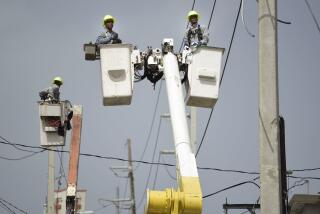Fight Looms as Big Rate Hike Is OKd by Postal Governors
- Share via
WASHINGTON — A battle over proposed record postal rate increases loomed Tuesday after the Postal Service won the first round in its attempt to raise the cost of mailing a first-class letter to 30 cents by next February.
The 19% average rate increase, the largest ever in percentage terms, is being proposed only three years after the last price hike, which raised the cost of mailing a first-class letter to 25 cents from 22 cents. The Postal Service Board of Governors gave its approval for the new rate increases Tuesday, meeting, as usual, in closed session.
Opponents, quickly coming forward to fight the raise, ranged from the U.S. Chamber of Commerce to consumer activist Ralph Nader, who called on Americans to contribute $10 a household to fund a new Nader-headed consumer action group to block future postage increases.
Also among the dissenters appeared to be Stephen A. Gold, director of the Postal Rate Commission’s in-house consumer advocacy office. In a statement, Gold urged that the consumer advocate office be given authority to intervene in federal courts. He called also for “increased consumer input” into the postage rate decision-making process.
The rate increase proposal now must go before the Postal Rate Commission, an independent board, for 10 months of hearings before final approval.
If the commission were to disallow the rate hike, the action could be overridden by a unanimous vote of the Board of Governors. However, the board was split in its vote Tuesday, Postmaster General Anthony M. Frank said.
Frank said that the increase is “too much, too soon,” and he promised to hold future cost increases below the rate of inflation.
Since Congress in 1971 created a separate Postal Service and mandated that it pay its own way without taxpayer subsidy, the Board of Governors has regularly approved increases, raising first-class postage from 6 cents then to the proposed 30 cents next year--a total increase of 400%.
However, Frank noted that U.S. postage remains the lowest in the industrialized world.
“Even at 30 cents, postage is one of America’s best buys,” he said.
The proposal would also increase the cost of mailing post cards to 20 cents, up a nickel, and express mail would go to $9.75 from $8.75. It would raise the cost of mailing a typical weekly news magazine to 16 cents from 13.5 cents, while a heavier monthly publication would rise to 37.4 cents from 29.7 cents. The parcel post rate for a 7-pound package would rise to $5.06 from $4.
Frank conceded that the requested increase of about 19% was above the 13% aggregate rise of consumer prices since 1988. However, he added that postal service costs jumped 8% just in 1988, when he became postmaster general, compared to slightly over 4% for all other items.
When asked why the Postal Service is seeking its largest rate increase ever, Frank replied, somewhat edgily: “I would be happy to help your confusion. We are required by law to break even. Our costs went up 19%; we are filing for 19%. There is not much discretion in what we can file for. We are allowed no subsidies, so we must get it from postage.”
Frank said that the Postal Service’s target of keeping future cost increases below the rate of inflation would in effect put the service on track to “pay back” to consumers the 6 percentage points over inflation called for in Tuesday’s rate increase proposal.
Most opponents focused on the performance of the agency. Tracey Schreft, Chamber of Commerce associate manager of community resources, and consumer activist Nader found themselves in rare agreement in pointing to the steady reduction in pickup and delivery services.
“With postal service at a record low and just three years after the largest-ever postal rate increase, the 20% rate hike proposed today . . . is unreasonable and unjustified,” Schreft said in a statement. “Postal Service costs have been out of control for too long, and business can no longer bear the burden.”
At a news conference called before the Board of Governors’ action, Nader also assailed the decline in service as prices have risen and called for greater public accountability for all future Postal Service policy decisions.
More to Read
Sign up for Essential California
The most important California stories and recommendations in your inbox every morning.
You may occasionally receive promotional content from the Los Angeles Times.












